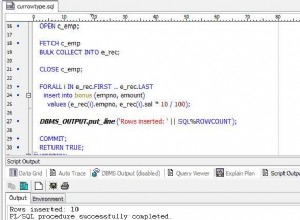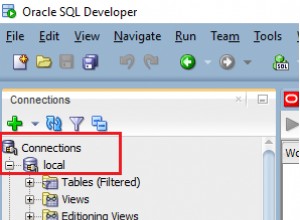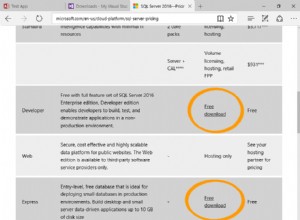En tant que MySQL le manuel dit :
Regardons l'exemple de table :
mysql> select * from articles;
+----+-----------------------+------------------------------------------+
| id | title | body |
+----+-----------------------+------------------------------------------+
| 1 | PostgreSQL Tutorial | DBMS stands for DataBase ... |
| 2 | How To Use MySQL Well | After you went through a ... |
| 3 | Optimizing MySQL | In this tutorial we will show ... |
| 4 | 1001 MySQL Tricks | 1. Never run mysqld as root. 2. ... |
| 5 | MySQL vs. YourSQL | In the following database comparison ... |
| 6 | MySQL Security | When configured properly, MySQL ... |
+----+-----------------------+------------------------------------------+
mysql> SELECT * FROM articles WHERE MATCH (title,body)
AGAINST ('"database comparison"' IN BOOLEAN MODE);
+----+-------------------+------------------------------------------+
| id | title | body |
+----+-------------------+------------------------------------------+
| 5 | MySQL vs. YourSQL | In the following database comparison ... |
+----+-------------------+------------------------------------------+
L'ordre compte, lorsque les mots sont cités :
mysql> SELECT * FROM articles WHERE MATCH (title,body)
AGAINST ('"comparison database"' IN BOOLEAN MODE);
Empty set (0.01 sec)
Lorsque nous supprimons les guillemets, il recherchera des lignes contenant les mots "base de données" ou "comparaison":
mysql> SELECT * FROM articles WHERE MATCH (title,body)
AGAINST ('database comparison' IN BOOLEAN MODE);
+----+---------------------+------------------------------------------+
| id | title | body |
+----+---------------------+------------------------------------------+
| 1 | PostgreSQL Tutorial | DBMS stands for DataBase ... |
| 5 | MySQL vs. YourSQL | In the following database comparison ... |
+----+---------------------+------------------------------------------+
L'ordre n'a plus d'importance maintenant :
mysql> SELECT * FROM articles WHERE MATCH (title,body)
AGAINST ('comparison database' IN BOOLEAN MODE);
+----+---------------------+------------------------------------------+
| id | title | body |
+----+---------------------+------------------------------------------+
| 1 | PostgreSQL Tutorial | DBMS stands for DataBase ... |
| 5 | MySQL vs. YourSQL | In the following database comparison ... |
+----+---------------------+------------------------------------------+
Si nous voulons obtenir des lignes contenant soit le mot "PostgreSQL" soit la phrase "comparaison de base de données", nous devons utiliser cette requête :
mysql> SELECT * FROM articles WHERE MATCH (title,body)
AGAINST ('PostgreSQL "database comparison"' IN BOOLEAN MODE);
+----+---------------------+------------------------------------------+
| id | title | body |
+----+---------------------+------------------------------------------+
| 1 | PostgreSQL Tutorial | DBMS stands for DataBase ... |
| 5 | MySQL vs. YourSQL | In the following database comparison ... |
+----+---------------------+------------------------------------------+
Assurez-vous que les mots que vous recherchez ne se trouvent pas dans liste des mots vides , qui sont ignorés.




